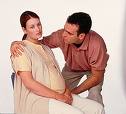Depression During Pregnancy Is Risky For Child – A Study Report
A new research has revealed that kids whose mothers had depression  during pregnancy are more prone to have delays to their growth.
during pregnancy are more prone to have delays to their growth.
The researchers at University of the West of England and the University of Bristol discovered that persistent antenatal depression raised the chances of poor physical and mental development by 34 percent.
If the depression continued after birth (postnatal depression) then the risk of developmental delay was estimated to be 50 percent.
Lead author Dr. Toity Deave from the Centre for Child and Adolescent Health at the University of the West of England, satated, “I believe the most important finding from our study is that maternal antenatal depression has a negative impact on children's cognitive development, even when postnatal depression has been taken into account.”
“The other important message is that it is the persistence of depression, as well as the intensity of antenatal depression, that has an impact on the child,” Dr, Deave added.
The study researchers viewed the records of 11,098 women and their kids who gave birth between the year 1991 and 1992.
They discovered that 8,262 (74.4%) women were not depressed either antenatally (during pregnancy) or postnatally.
Around 1,565 (14.1%) women were depressed on at least one occasion antenatally but not postnatally, whereas 537 (4.8%) women were depressed on at least one of two occasions when they were examined postnatally, but at neither occasion in pregnancy.
About 156 (1.4%) women were persistently depressed both antenatally and postnatally.
The authors said that they found out a relationship between “persistent depression during pregnancy and developmental delay, with a 50% increase in the odds of developmental delay associated with persistent antenatal depression.”
And they stated that the study results could better inform health workers treating pregnant women.
"These findings add to the growing body of research, suggesting that maternal psychological wellbeing during pregnancy has important consequences for child development.”
"Women who are between 15 and 44 years form a group in which depression is the leading cause of disease burden worldwide. Therefore, obstetricians, midwives and GPs can play an active role in assessing and identifying maternal depression,” the authors added up.
The findings of the study were published in the journal ‘BJOG: An International Journal of Obstetrics and Gynaecology.’